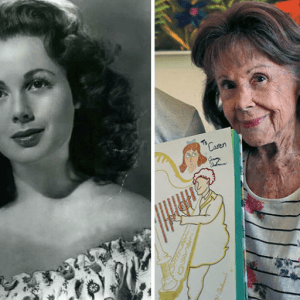
Imagine a woman who carried the elegance of Hollywood’s golden era yet lived with the bravery of an explorer. That’s Tippi Hedren. Her story is not just about stardom — it’s about reinvention, resilience, and heart. Born in a small Minnesota town, she rose from a fashion model to one of Alfred Hitchcock’s most unforgettable leading ladies. But beyond fame and film, she carved out a deeper legacy: protecting wildlife, empowering women, and shaping a family dynasty that still defines Hollywood today.
From Minnesota Dreams to Hollywood Lights
Nathalie Kay “Tippi” Hedren was born on January 19, 1930, in New Ulm, Minnesota. Growing up in America’s heartland, she learned early on the value of perseverance. Her journey began in modeling, where she mastered elegance and confidence in front of the camera. Each pose, every graceful glance, became her silent audition for something greater. Those early experiences built the foundation for the poised, unshakable screen presence that would later captivate millions.
Video: Alfred Hitchcock’s The Birds
The Hitchcock Discovery That Changed Everything
Sometimes destiny finds you when you least expect it. For Tippi, it came in the form of a television commercial. Alfred Hitchcock saw her and instantly recognized something rare — a blend of vulnerability and strength. He cast her in The Birds (1963), and overnight, she became a sensation.
In The Birds, Hedren portrayed Melanie Daniels with calm intensity, balancing fear and elegance in ways few actresses could. Her performance won her the Golden Globe for New Star of the Year and established her as a leading figure in cinema. She followed it with Marnie (1964), a psychological masterpiece that allowed her to explore trauma, identity, and emotional depth far ahead of its time.

Building a Career Beyond Fame
Many actors peak early, but Tippi Hedren evolved. She refused to be defined by a single role or moment. From guest appearances on television to independent film projects, she stayed relevant across decades. Even her brief return in The Birds II: Land’s End (1994) reminded audiences that her star never truly dimmed. She represented an era where grace met courage — where fame was earned through authenticity, not spectacle.
The Wild Journey of Roar
In 1981, Tippi and her then-husband Noel Marshall took on one of Hollywood’s most daring projects: Roar. Filmed with real lions and tigers, the movie blurred the line between art and danger. Injuries were frequent, chaos was constant, but what emerged from that chaos was life-changing.
Video: Roar Official Re-Release Trailer #1 (2015) – Tippi Hedren, Noel Marshall, Melanie Griffith
The experience awakened something powerful in Tippi — a lifelong devotion to animal welfare. Out of the film’s turmoil, she founded The Roar Foundation and later, the Shambala Preserve in California. These sanctuaries became safe havens for exotic animals that couldn’t survive in the wild. Through Shambala, she turned a near-disaster into a mission that continues to inspire conservationists around the world.
The Shambala Preserve: A Legacy of Compassion
Tippi’s sanctuary isn’t just a refuge for animals — it’s a symbol of what passion can achieve. Shambala houses lions, tigers, leopards, and cougars, many rescued from neglect or illegal captivity. Tippi’s advocacy helped shift public perception, pushing for legislation against private ownership of wild cats in the United States.

Her tireless work made her more than an actress; she became a voice for those who couldn’t speak. Every visitor who walks through Shambala leaves with a renewed respect for nature — a reflection of Tippi’s lifelong belief that humanity and wildlife can coexist with empathy and respect.
Empowering Women Through Unexpected Means
Tippi’s compassion extended far beyond Hollywood and animal advocacy. In 1975, while working with Vietnamese refugees, she noticed that many women were struggling to rebuild their lives. She decided to teach them a skill she knew well — manicuring. What began as a simple act of kindness blossomed into an industry that changed lives.
Video: Tippi Hedren In Conversation on Alfred Hitchcock
That small program sparked the rise of the Vietnamese nail salon movement in the United States. Today, that industry empowers hundreds of thousands of women and families — all thanks to one woman’s empathy and initiative. Tippi’s influence reached far beyond film and fame; she became a quiet architect of opportunity.
A Family That Carries the Torch
The Hedren legacy didn’t stop with Tippi. Her daughter, Melanie Griffith, rose to fame in films like Working Girl, earning her own place among Hollywood’s elite. And her granddaughter, Dakota Johnson, now carries that torch into the modern era with global hits like Fifty Shades of Grey and Persuasion.

Three generations of women, each defining success in their own time — all bound by the same creative fire. It’s a lineage built on strength, grace, and individuality.
Tippi Hedren Today: A Living Legend
At 95, Tippi Hedren continues to embody elegance and conviction. Her classic films are streaming for new generations, her sanctuary thrives, and her name remains synonymous with courage and compassion. She still appears at film retrospectives and environmental events, radiating the same poise that once captivated Hitchcock himself.
What makes her legacy so powerful is its depth. She wasn’t just a star — she was a trailblazer who turned fame into purpose. In a world that often measures success by fleeting attention, Tippi stands as proof that true greatness is timeless.

Tippi Hedren’s life is a masterpiece of reinvention. From a small-town model to a Hollywood icon, from film sets filled with chaos to sanctuaries filled with peace, she’s lived with courage, integrity, and vision. Her performances in The Birds and Marnie may have made her a star, but her compassion made her unforgettable.
She showed us that real legacy isn’t built on fame — it’s built on impact. Through art, activism, and empathy, Tippi Hedren transformed the world around her. And even decades later, her story continues to remind us all that elegance means little without purpose, and courage means everything.


